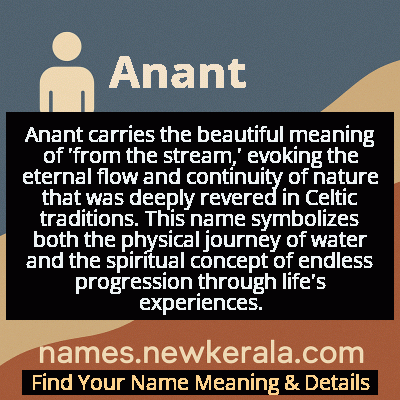Anant Name Meaning & Details
Origin, Popularity, Numerology Analysis & Name Meaning of Anant
Discover the origin, meaning, and cultural significance of the name ANANT. Delve into its historical roots and explore the lasting impact it has had on communities and traditions.
Name
Anant
Gender
Male
Origin
Celtic
Lucky Number
5
Meaning of the Name - Anant
Anant carries the beautiful meaning of 'from the stream,' evoking the eternal flow and continuity of nature that was deeply revered in Celtic traditions. This name symbolizes both the physical journey of water and the spiritual concept of endless progression through life's experiences.
Anant - Complete Numerology Analysis
Your Numerology Number
Based on Pythagorean Numerology System
Ruling Planet
Mercury
Positive Nature
Adventurous, dynamic, curious, and social.
Negative Traits
Restless, impatient, inconsistent, prone to indulgence.
Lucky Colours
Green, white.
Lucky Days
Wednesday.
Lucky Stones
Emerald.
Harmony Numbers
1, 3, 9.
Best Suited Professions
Sales, marketing, travel, entertainment.
What People Like About You
Versatility, charisma, adventurous spirit.
Famous People Named Anant
Anant Pai
Educator and Publisher
Founder of Amar Chitra Katha, revolutionized Indian children's literature
Anant Nag
Actor
Renowned Indian film actor with over 300 films in Kannada cinema
Anant Agarwal
Computer Scientist
CEO of edX and MIT professor pioneering online education
Anant Kumar
Author
Award-winning Hindi writer and novelist
Name Variations & International Equivalents
Click on blue names to explore their detailed meanings. Gray names with will be available soon.
Cultural & Historical Significance
The cultural significance extends beyond geographical boundaries, making Anant a truly global name with deep philosophical roots. In Hindu tradition, Anant is another name for Vishnu and represents the cosmic serpent Shesha, who supports the universe. This connects to the Celtic stream symbolism through the idea of foundational support and eternal flow. The name's ability to transcend cultural specificities while maintaining deep meaning makes it particularly valuable in our increasingly interconnected world, serving as a bridge between different spiritual understandings of eternity and natural flow.
Extended Personality Analysis
Individuals named Anant are often perceived as having a calm, flowing nature reminiscent of water's steady movement. They typically exhibit remarkable adaptability and resilience, able to navigate life's challenges with grace and persistence. Their personality often reflects the stream's characteristics—sometimes gentle and reflective, other times determined and forceful when overcoming obstacles. Anants are frequently seen as deeply philosophical individuals who possess an innate understanding of life's continuity and cycles. They tend to be excellent listeners and observers, absorbing information and emotions much like a stream gathers water from its surroundings.
This flowing nature often translates into creative and intellectual pursuits where continuity and development are key. Anants typically demonstrate patience and long-term thinking, understanding that meaningful results often require sustained effort over time. They're often drawn to careers in education, counseling, environmental sciences, or arts where their natural flow and connection to larger patterns can be fully expressed. In relationships, they're known for their loyalty and steady presence, though they may sometimes struggle with being too accommodating or resistant to abrupt changes that disrupt their natural rhythm. Their strength lies in their ability to persist through difficulties while maintaining their core values and direction.
Modern Usage & Popularity
In contemporary times, Anant has gained popularity as a multicultural name that appeals to parents seeking something meaningful yet distinctive. While traditionally more common in Indian communities, the name has seen increased usage in Western countries as cultural exchange grows. Its appeal lies in its positive connotations of eternity, flow, and continuity, making it attractive to parents who value these qualities. The name maintains a moderate level of popularity without becoming overly common, striking a balance between uniqueness and familiarity. Recent years have shown a steady increase in its usage globally, particularly among families with interests in spirituality, nature-based philosophies, or multicultural backgrounds who appreciate its deep symbolic meaning and cross-cultural accessibility.
Symbolic & Spiritual Meanings
Symbolically, Anant represents the eternal flow of existence and the continuum of life. Like a stream that constantly moves yet remains connected to its source, the name embodies the paradox of change within permanence. It symbolizes adaptability—the ability to flow around obstacles while maintaining one's essential nature. The stream metaphor extends to represent life's journey, with its twists, turns, and constant forward motion. In spiritual contexts, Anant signifies the infinite consciousness that underlies all temporal existence, the unbroken thread connecting past, present, and future. This makes the name particularly powerful for those who see life as an ongoing process of growth and transformation rather than a series of disconnected events, embodying both the Celtic reverence for natural flows and the Eastern understanding of cosmic infinity.

